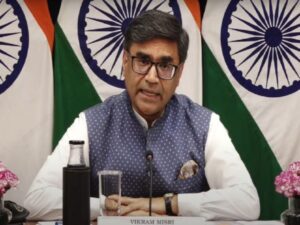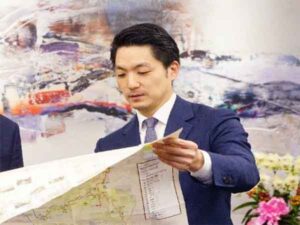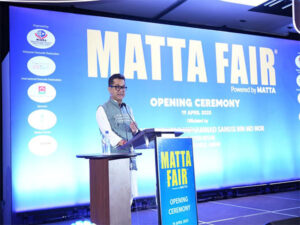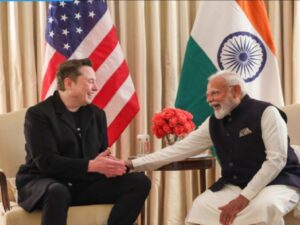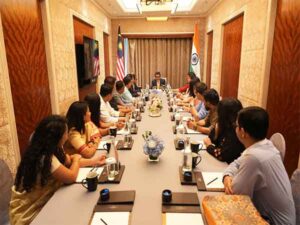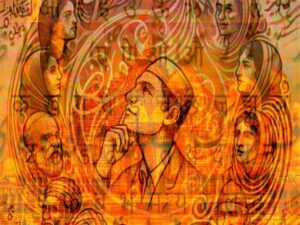Harassment, patriarchy and inflation come under fire in Pakistan’s “Aurat March”
Karachi [Pakistan], March 13 (ANI): Raising voice over the many injustices in society, raising awareness on multiple issues, and standing up for each other, “Hum Aurtein” managed to gather, in no particular order, women, men, transgender persons, workers, peasants, members of minority communities, students and children at the sixth Aurat March in all its unapologetic, unabashed brazenness at the Burns Garden on Sunday, Dawn reported.
There were stories to listen to, faces to read along with interesting posters and placards.
There were also taboos to be broken. One placard had the words ‘Sunno, Samjho, Seekho, Badlo (Listen, understand, learn, change), and another read ‘We Are Not Ovary-Acting’. Some other interesting messages on placards included ‘I Want To Exist Without Apology’, ‘Abort the patriarchy’, ‘Anti-hero’ and ‘Bachay Paida Kerne Hain Tau Inn Ki Perverish Bhi Kerna Seekh Lo [You want children, then learn to bring them up also].
Rukhsana Paveen Khokhar had her eight-month-old daughter, Mashal, in her arms who was looking around inquisitively while taking in her surroundings and the happenings. “I have named her ‘Mashal’ because I want her to light up the path for everyone. Similarly, I have named my other daughter, who is six, Mazaib, meaning beautiful like the moon. The moon also lights the night sky,” she explained, adding that her mother, Khandul Mai, was also there at the Aurat March with her, Dawn wrote while quoting women participating in the “Aurat March”.
People from all walks of life poured their hearts out as fiery slogans heated up Burns Garden.
Meanwhile, up on the stage, there were people coming up to tell you about their struggles, and their issues. There were performances, singing of songs, acting out skits and tableaux. The Network of Organisations Working For People With Disabilities Pakistan (NOWPDP), had arranged for wheelchairs for the disabled or the elderly, Dawn reported.
Speaking about the Aurat March, economist Kaiser Bengali, who has attended all six marches, said that it was an opportunity to express themselves, which was an important pillar of our social ideology. “It tells us how society should be organised, pluralised with freedom,” he said.
Architect and town planner Arif Hasan, who was also there, said that he had so far attended five marches and that the Aurat March was a movement.
Fatima Majeed from the fisherfolk community came up to talk about the hardships fisherfolks face, about pollution in the seas, and about dirty fuel for power generation such as coal.
Dawn reported that labourers and workers lamented loudly about inflation and the rising costs of fuel, Pastor Ghazala Shafique spoke about minority rights, sanitation workers, crimes and injustices against minor girls abducted and made to change their faiths.
Radha Bheel spoke about bonded labour and how girls were chained as they worked. How they are also raped as they work like slaves. “We are fighting against child labour, we are fighting for education, for respect,” she said.
Women from Lyari spoke about how the skin of their hands burned and their nails crack while peeling red chillies, tamarind and garlic. Other women spoke about harassment in the workplace.
Laali from Mirpurkhas came up to talk about the difficulties women in the flood-affected areas have been facing.
Transgender community members Bindiya Rana, Shahzadi Rai, Mehrub Moiz Awan and rapper Jaan-e-Hasina brought up the difficulties faced by their community.
Arzoo Raja, Neha Pervaiz and other teenage Christian girls, who have now recovered after they married Muslim men as old as their fathers, came up to tell their own stories in the form of a tableau. “I have a body, I have a soul and I have my faith,” they sang.
“We don’t speak about any one woman, we raise voices for all women, from all communities, classes, faith and sects. We raise voice for all genders, too,” said social activist and classical dancer Sheema Kermani.
Dawn reported that there was also a small celebration of Holi as all the participants of the Aurat March rubbed colour on each other’s cheeks. Many participants, who felt they have been wronged in any way in life, were also invited to dip their palms in red colour and leave their palm impressions on a long white cloth that had inscribed in red the words ‘The injustice done to you will not be forgotten’.
Chanting slogans then and reading out their charter of demands, the Aurat March then moved out of Burns Garden to march to the Fawwara Chowk.

